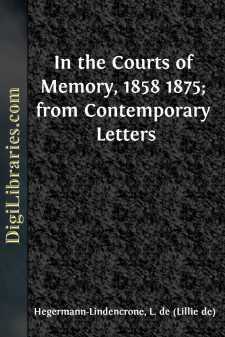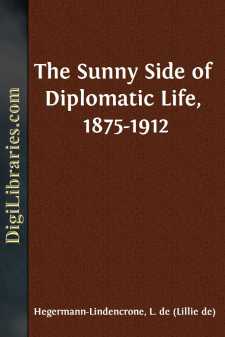Categories
- Antiques & Collectibles 13
- Architecture 36
- Art 48
- Bibles 22
- Biography & Autobiography 813
- Body, Mind & Spirit 142
- Business & Economics 28
- Children's Books 17
- Children's Fiction 14
- Computers 4
- Cooking 94
- Crafts & Hobbies 4
- Drama 346
- Education 46
- Family & Relationships 57
- Fiction 11829
- Games 19
- Gardening 17
- Health & Fitness 34
- History 1377
- House & Home 1
- Humor 147
- Juvenile Fiction 1873
- Juvenile Nonfiction 202
- Language Arts & Disciplines 88
- Law 16
- Literary Collections 686
- Literary Criticism 179
- Mathematics 13
- Medical 41
- Music 40
- Nature 179
- Non-Classifiable 1768
- Performing Arts 7
- Periodicals 1453
- Philosophy 64
- Photography 2
- Poetry 896
- Political Science 203
- Psychology 42
- Reference 154
- Religion 513
- Science 126
- Self-Help 84
- Social Science 81
- Sports & Recreation 34
- Study Aids 3
- Technology & Engineering 59
- Transportation 23
- Travel 463
- True Crime 29
In the Courts of Memory, 1858 1875; from Contemporary Letters
Description:
Excerpt
CAMBRIDGE, 1856.
DEAR M.,—You say in your last letter, "Do tell me something about your school." If I only had the time, I could write volumes about my school, and especially about my teachers.
To begin with, Professor Agassiz gives us lectures on zoölogy, geology, and all other ologies, and draws pictures on the blackboard of trilobites and different fossils, which is very amusing. We call him "Father Nature," and we all adore him and try to imitate his funny Swiss accent.
Professor Pierce, who is, you know, the greatest mathematician in the world, teaches us mathematics and has an awful time of it; we must be very stupid, for the more he explains, the less we seem to understand, and when he gets on the rule of three we almost faint from dizziness. If he would only explain the rule of one! The Harvard students say that his book on mathematics is so intricate that not one of them can solve the problems.
We learn history and mythology from Professor Felton, who is very near- sighted, wears broad-brimmed spectacles, and shakes his curly locks at us when he thinks we are frivolous. He was rather nonplussed the other day, when Louise Child read out loud in the mythology lesson something about "Jupiter and ten." "What," cried Mr. Felton, "what are you reading? You mean 'Jupiter and Io,' don't you?" "It says ten here," she answered.
Young Mr. Agassiz teaches us German and French; we read Balzac's Les
Chouans and Schiller's Wallenstein.
Our Italian teacher, Luigi Monti, is a refugee from Italy, and has a sad and mysterious look in his black eyes; he can hardly speak English, so we have things pretty much our own way during the lessons, for he cannot correct us. One of the girls, translating capelli neri, said "black hats," and he never saw the mistake, though we were all dying of laughter.
No one takes lessons in Greek from long-bearded, fierce-eyed Professor Evangelinus Apostolides Sophocles, so he is left in peace. He does not come more than once a week anyway, and then only to say it is no use his coming at all.
Cousin James Lowell replaces Mr. Longfellow the days he can't come. He reads selections of "literary treasures," as he calls them, and on which he discourses at length. He seems very dull and solemn when he is in school; not at all as he is at home. When he comes in of an afternoon and reads his poems to aunty and to an admiring circle of cousins and sisters- in-law, they all roar with laughter, particularly when he reads them with a Yankee accent. He has such a rippling little giggle while reading, that it is impossible not to laugh.
The other day he said to me, "Cousin Lillie, I will take you out for a walk in recess." I said, "Nothing I should like better, but I can't go." "Why not?" said he. "Because I must go and be a beggar." "What do you mean?" he asked. "I mean that there is a duet that Mrs. Agassiz favors just now, from Meyerbeer's 'Le Prophète,' where she is beggar number one and I am beggar number two." He laughed. "You are a lucky little beggar, anyway....



